ADDICTION
ALCOHOL DEPENDENCE
QUIT SMOKING
ALLERGY
ANTI FUNGAL
FUNGAL INFECTION
FUNGAL NAIL INFECTIONS
ANTI-REJECTION DRUGS
ANTI WORM
ANTIBIOTIC
BACTERIAL INFECTIONS
ARTHRITIS
GOUT
OSTEOARTHRITIS
RHEUMATOID ARTHRITIS
BLOOD
LOW PLATELET COUNT
THROMBOPHLEBITIS
VARICOSE VEINS
COLON
ANAL FISSURE
PILES
ULCERATIVE COLITIS
DIABETES CARE
DIABETES INSIPIDUS
DIABETES TYPE
DIABETIC FOOT ULCERS
GLUCOSE MONITOR
EYES/EAR CARE
DRY EYES
EYE CARE
EYE EXAMINATION
EYE INFECTION
EYE LASHES
EYE PAIN
GLAUCOMA
OCULAR HYPERTENSION
UVEITIS
FEVER CARE
MALARIA
RHEUMATIC FEVER
TYPHOID FEVER
GASTROINTESTINAL
ACIDITY
CONSTIPATION
CROHN'S DISEASE
DIARRHOEA
GALLBLADDER STONES
INTESTINAL ULCERS
IRRITABLE BOWEL SYNDROME
MOTION SICKNESS
NAUSEA
Lipicard 160 mg (Fenofibrate)
| Active Ingredient (Generic Name): | Fenofibrate |
|---|---|
| Indication: | High triglycerides, High cholesterol |
| Manufacturer: | USV Pvt Ltd |
| Packaging: | 10 tablets in one strip |
| Strength: | 160 mg |
From: $28.00
When taking Lipicard 160 mg (Fenofibrate), you aim to lower triglyceride levels and boost ‘good’ cholesterol. This medicine, a fibrate class member, decreases heart disease, stroke, and pancreatitis risks. Swallow it whole once daily with a full glass of water. Crushing or chewing the tablets isn’t recommended. High cholesterol, often symptomless, can be harmful. To manage cholesterol effectively when lifestyle changes aren’t enough, Lipicard 160 mg is essential. It’s integral to consult physicians before altering medications to guarantee optimum health. Utilizing this medication correctly is crucial for favorable outcomes. Understand its functions for better health.
Start by taking Lipicard 160 mg as prescribed by your healthcare provider for best results. This medication belongs to a class of drugs known as fibrates, which work by decreasing the levels of triglycerides and increasing the levels of "good" cholesterol (HDL) in your blood. By following your healthcare provider’s instructions carefully, you can maximize the benefits of Lipicard 160 mg.
It is essential to take Lipicard 160 mg exactly as directed, typically once a day with a full glass of water. Do not crush, chew, or break the tablets, as they are designed to release the medication slowly into your system. Remember to continue taking this medication even if you feel well, as high cholesterol often has no symptoms but can still be damaging to your health.
If you miss a dose, take it as soon as you remember, but do not double up on doses to make up for a missed one. Inform your healthcare provider if you experience any side effects or have any concerns while taking Lipicard 160 mg.
Why is this medication prescribed?
Prescribed to help lower triglyceride levels and increase ‘good’ cholesterol, Lipicard 160 mg is a medication belonging to the class of fibrates. High triglyceride levels can increase the risk of heart disease, stroke, and pancreatitis. By reducing triglycerides, fenofibrate helps lower this risk. Additionally, fenofibrate can raise high-density lipoprotein (HDL) cholesterol, commonly known as ‘good’ cholesterol. HDL cholesterol helps remove low-density lipoprotein (LDL) cholesterol, the ‘bad’ cholesterol, from the bloodstream, further reducing the risk of heart disease.
Doctors may prescribe Lipicard 160 mg when lifestyle changes such as diet and exercise alone are not enough to control cholesterol levels. It is essential to follow your healthcare provider’s instructions carefully when taking this medication. Lipicard 160 mg is typically part of a full treatment plan that includes a healthy diet, regular exercise, and other cholesterol-lowering medications if necessary. Always consult your doctor before starting or stopping any medication regimen to make sure it is safe and effective for your specific health needs.
How should this medicine be used?
When using Lipicard 160 mg (fenofibrate), make sure to strictly adhere to the prescribed dosage and frequency as directed by your healthcare provider. Typically, this medication is taken orally once a day, with or without food. It is essential to swallow the tablet whole and not crush, chew, or break it. Remember to follow your healthcare provider’s instructions precisely to maximize the benefits of Lipicard 160 mg.
It is vital to continue taking Lipicard 160 mg even if you feel well. Consistency in your medication routine is key to its effectiveness. If you happen to miss a dose, take it as soon as you remember, unless it is close to the time for your next dose. In that case, skip the missed dose and continue with your regular schedule. Do not take a double dose to make up for the missed one. If you have any questions or concerns about how to use Lipicard 160 mg, do not hesitate to consult your healthcare provider for guidance.
Other uses for this medicine
If your healthcare provider approves, Lipicard 160 mg (fenofibrate) may also be used to help lower triglycerides in your blood. High levels of triglycerides can increase your risk of heart disease and other cardiovascular problems. Fenofibrate works by decreasing the production of triglycerides in the liver, thereby reducing their levels in the bloodstream.
Additionally, fenofibrate has been found to increase levels of ‘good’ cholesterol (HDL) while decreasing ‘bad’ cholesterol (LDL) levels. This can further benefit your heart health by improving your cholesterol profile.
In some cases, fenofibrate may also be prescribed to individuals with certain types of pancreatitis to help reduce the risk of future episodes. Pancreatitis is a condition characterized by inflammation of the pancreas, and high triglyceride levels are often associated with this condition.
Always follow your healthcare provider’s instructions carefully when using Lipicard 160 mg for these alternative purposes. It is important to monitor your lipid levels regularly and report any side effects or concerns to your healthcare provider promptly.
What special precautions should I follow?
Before taking Lipicard 160 mg (fenofibrate), it is essential to check for any existing medical conditions that may interact with this medication. Make sure to inform your healthcare provider about any allergies, especially if you have a history of allergic reactions to fenofibrate or similar drugs. Additionally, consider discussing any current medications, vitamins, or herbal supplements you are taking to prevent any potential interactions.
Check Existing Medical Conditions
What medical conditions should you check for before starting Lipicard 160 Mg (Fenofibrate)? Before beginning treatment with Lipicard 160 Mg, it is crucial to assess your existing medical conditions to guarantee the medication’s safety and effectiveness. Here are some conditions you should be mindful of:
- Liver Disease: Individuals with liver issues may necessitate dosage adjustments or close monitoring when using Lipicard 160 Mg.
- Kidney Disease: Patients with kidney problems should consult their healthcare provider before starting this medication to avoid any adverse effects.
- Gallbladder Disease: Those with gallbladder conditions should exercise caution and inform their doctor as Fenofibrate can worsen these issues.
What special dietary instructions should I follow?
Make sure your diet is low in saturated fats and cholesterol while taking Lipicard 160 mg (Fenofibrate). This medication works best when combined with a healthy diet. Include plenty of fruits, vegetables, whole grains, and lean proteins in your meals. Limit your intake of red meat, processed foods, and fried dishes. Opt for cooking methods like grilling, baking, or steaming instead of frying. Choose low-fat dairy products and use healthy oils like olive or canola oil for cooking. Avoid trans fats commonly found in packaged snacks and baked goods. Read food labels carefully to identify hidden sources of unhealthy fats. Consider consulting a dietitian to help you create a personalized meal plan that aligns with your medication and health goals. Remember to stay hydrated by drinking plenty of water throughout the day. By following these dietary instructions, you can enhance the effectiveness of Lipicard 160 mg and promote overall well-being.
What should I do if I forget a dose?
If you skip a dose of Lipicard 160 mg (Fenofibrate), take it as soon as you remember. However, if it is nearly time for your next scheduled dose, skip the missed dose and continue with your regular dosing schedule. Do not take an extra dose to compensate for the one you missed as this can heighten the risk of experiencing side effects. It is crucial to maintain a consistent dosing schedule to guarantee the medication’s effectiveness in managing your condition.
If you realize you have missed a dose and are unsure about what to do, it is recommended to consult your healthcare provider or pharmacist for guidance. They can offer personalized advice based on your specific situation and help you determine the best course of action. Remembering to take your medication as prescribed is vital for achieving the desired therapeutic outcomes, so it is important to establish a routine that works for you to reduce the chances of missing a dose in the future.
What side effects can this medication cause?
When taking Lipicard 160 Mg (Fenofibrate), it’s important to be aware of potential side effects. Some side effects can be serious and may require immediate medical attention. If you experience persistent symptoms like severe stomach pain, yellowing of the skin or eyes, or unexplained muscle weakness, contact your doctor promptly.
Persistent Side Effects?
Potential persistent side effects of Lipicard 160 mg (Fenofibrate) may include:
- Digestive Issues: You might experience persistent stomach pain, nausea, or diarrhea.
- Muscle Problems: This medication could lead to persistent muscle pain, weakness, or tenderness.
- Liver Abnormalities: In some cases, persistent changes in liver function tests may occur, so regular monitoring is essential to guarantee your liver health.
It is important to consult your healthcare provider if you encounter consistent or troubling side effects while taking Lipicard 160 mg (Fenofibrate). Regular monitoring and open communication with your doctor can help manage any persistent side effects effectively.
Some side effects can be serious. If you experience any of the following symptoms, call your doctor immediately:
If you experience any of the following symptoms while taking Lipicard 160 mg (Fenofibrate), promptly contact your doctor for immediate assistance. Some side effects can be critical, and it is vital to seek medical attention if you encounter any of the following:
- Severe stomach pain
- Persistent nausea or vomiting
- Unexplained muscle weakness or tenderness
These symptoms could indicate potentially severe complications that require urgent medical evaluation. Your healthcare provider will be able to assess the situation and provide appropriate guidance or treatment. Do not overlook these signs, as they may be indicative of serious issues that need prompt attention to guarantee your well-being.
What should I know about the storage and disposal of this medication?
To guarantee the effectiveness and safety of Lipicard 160 mg (Fenofibrate), it is vital to store the medication properly and dispose of it responsibly. When storing Lipicard 160 mg, keep it at room temperature away from moisture and heat. Avoid storing it in the bathroom or kitchen where humidity can affect its potency. Keep the medication out of reach of children and pets to prevent accidental ingestion. Make sure that the packaging is tightly closed when not in use to protect the tablets from exposure to air and moisture.
When it comes to disposing of Lipicard 160 mg, do not flush it down the toilet or pour it down the drain unless instructed to do so. Instead, consult your pharmacist or local waste disposal company on the proper way to dispose of unused or expired medication. This helps prevent environmental contamination and accidental ingestion by others. Follow any specific disposal instructions provided with the medication packaging to ensure safe and responsible disposal.
In case of an emergency/overdose
In case of an emergency or overdose with Lipicard 160 mg (Fenofibrate), immediately call poison control or seek medical assistance. An overdose of Lipicard can lead to symptoms like severe stomach pain, nausea, vomiting, and difficulty breathing. It is important not to ignore these signs, as they could indicate a serious problem that requires immediate medical attention.
If you suspect an overdose or witness someone experiencing severe symptoms after taking Lipicard 160 mg, do not hesitate to contact emergency services. Provide them with all the necessary information, including the amount of medication ingested and the time of ingestion. This will help healthcare professionals determine the best course of action to take in response to the overdose.
What other information should I know?
Consider informing your healthcare provider about all the medications and supplements you are currently taking while using Lipicard 160 mg (Fenofibrate). This is vital to avoid any potential interactions that could impact the effectiveness of the medication or your overall health. Additionally, it is important to follow a healthy diet low in saturated fats, cholesterol, and calories while taking Lipicard 160 mg. Regular exercise and weight management can also complement the effects of the medication in controlling cholesterol levels.
It is essential to attend follow-up appointments with your healthcare provider to monitor your progress and any potential side effects of Lipicard 160 mg. Be sure to report any unusual symptoms or changes in your health during these visits. Keep Lipicard 160 mg out of reach of children and store it at room temperature, away from moisture and heat. Do not share your medication with others, even if they have similar symptoms. If you miss a dose, take it as soon as you remember, unless it is almost time for your next dose.
Brand names
When looking for Lipicard 160 mg (Fenofibrate) at pharmacies, you may also find it under the brand names Fenoglide or Tricor. These brand names refer to the same medication that contains fenofibrate as the active ingredient. It is important to note that while the generic name is fenofibrate, brand names like Fenoglide and Tricor are also widely recognized and used by healthcare providers and pharmacists. Below is a table showing the different brand names for Lipicard 160 mg (Fenofibrate):
| Brand Name | Commonly Used for Lipicard 160 mg (Fenofibrate) |
|---|---|
| Fenofibrate | Yes |
| Fenoglide | Yes |
| Tricor | Yes |
These brand names are often used interchangeably, so if you are prescribed Lipicard 160 mg (Fenofibrate) and the pharmacy provides you with either Fenoglide or Tricor, rest assured that you are receiving the correct medication with the same active ingredient.
Purchase Locations
To secure Lipicard 160 mg (Fenofibrate), explore various pharmacies and online retailers. Lipicard 160 mg can typically be found in well-known chain pharmacies such as CVS, Walgreens, and Rite Aid. These pharmacies often carry a range of cholesterol medications, including fenofibrate. Additionally, independent local pharmacies may also stock Lipicard 160 mg, offering a more personalized service experience.
Online retailers provide another convenient option for purchasing Lipicard 160 mg. Websites like HealthWarehouse.com, Healthline, and Netmeds offer the medication for sale and may provide discounts or home delivery options. It is vital to confirm that when buying medication online, the source is reputable and licensed to sell pharmaceuticals.
Furthermore, consulting with your healthcare provider or pharmacist can also help in identifying reliable sources to purchase Lipicard 160 mg. They may recommend specific pharmacies or online retailers based on your location, insurance coverage, or previous experiences. Remember to always follow your healthcare provider’s guidance when purchasing and taking any medication.
To summarise
To wrap up, make sure you explore various sources, such as pharmacies and online retailers, to purchase Lipicard 160 mg (Fenofibrate) effectively. When buying Lipicard 160 mg, it is essential to compare prices and availability from different outlets to secure the best deal. By checking both physical pharmacies and online stores, you can find competitive prices and convenient options for acquiring your medication.
Additionally, consider consulting with your healthcare provider before making a purchase to confirm Lipicard 160 mg is the right medication for your condition. Your doctor can provide valuable insights into dosage, potential side effects, and other essential information to guide your purchasing decision effectively.
Furthermore, always verify the legitimacy of the sources from which you plan to buy Lipicard 160 mg. Ensure that the pharmacies or online retailers are reputable and authorized to sell medication to guarantee the quality and authenticity of the product you receive. Prioritizing safety and reliability when purchasing Lipicard 160 mg is vital for maintaining your health and well-being.


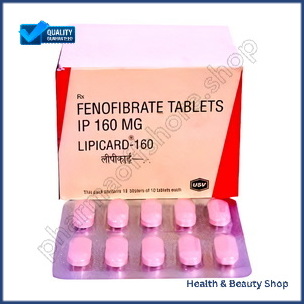
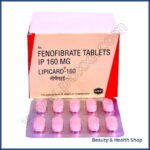
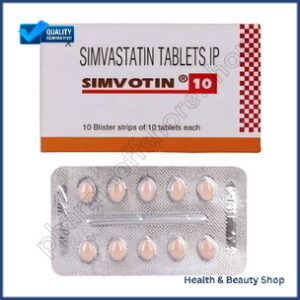
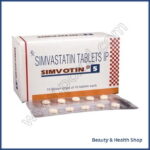
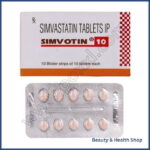
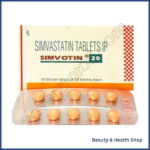
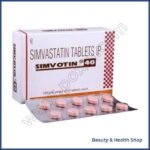
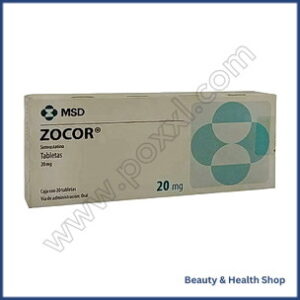
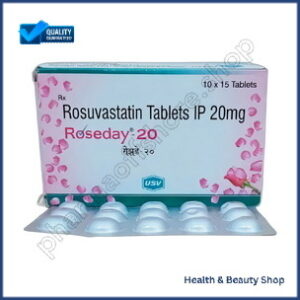
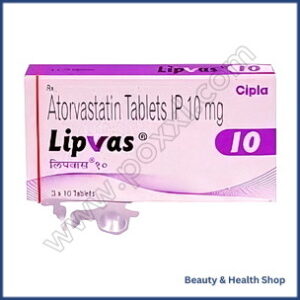
There are no reviews yet.